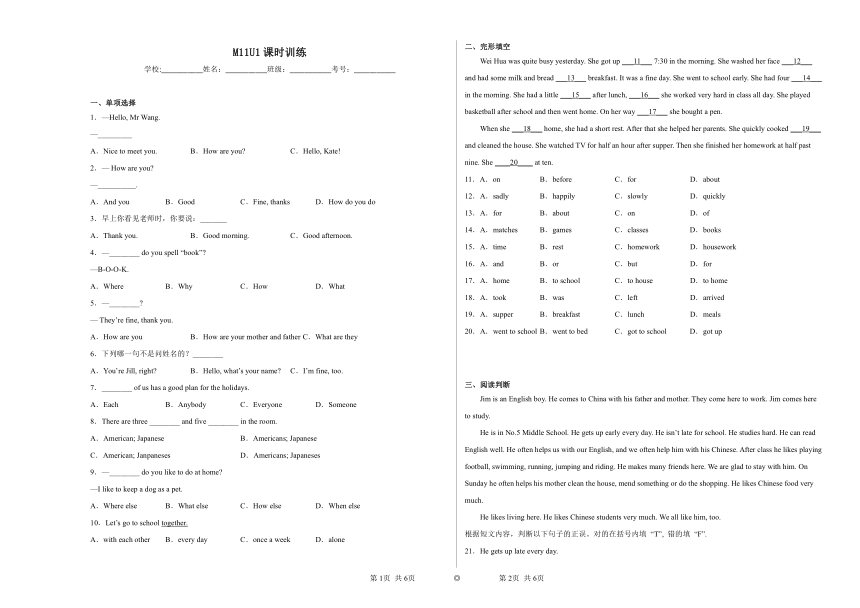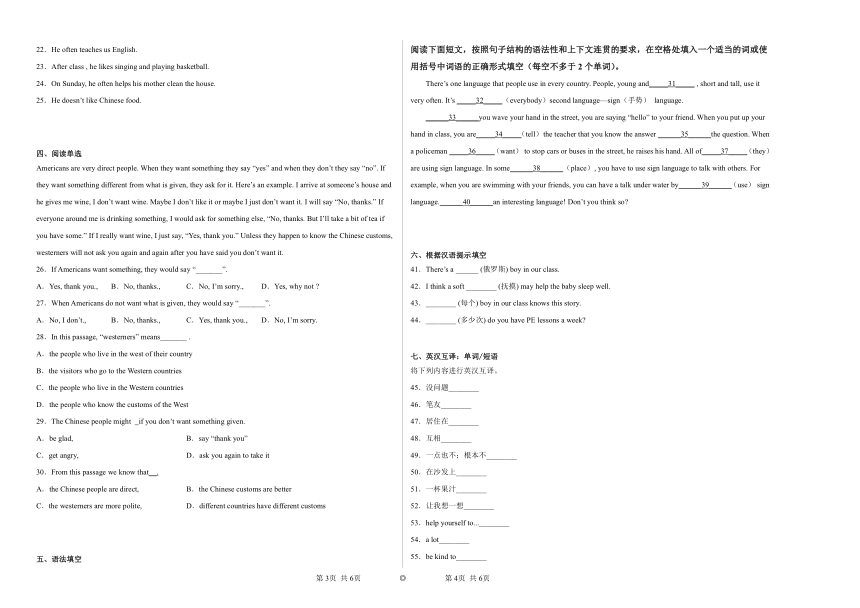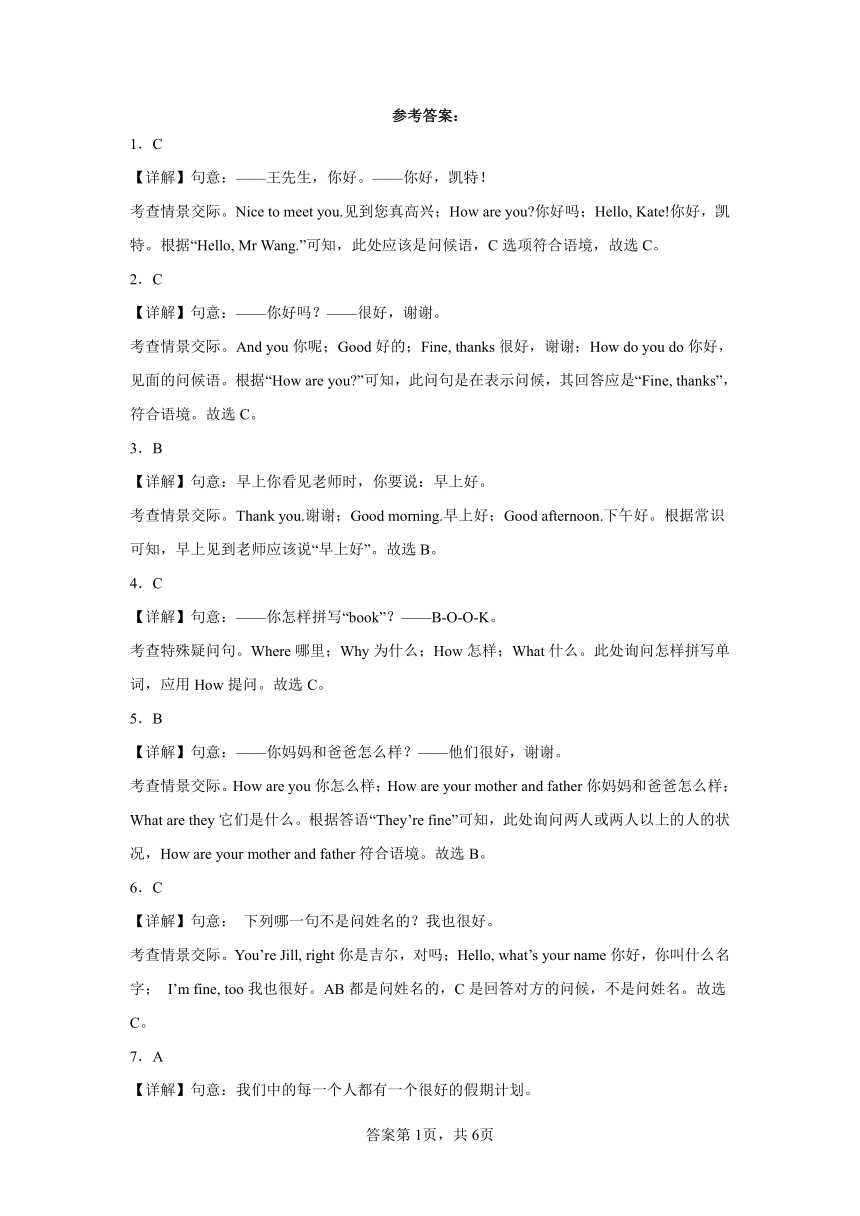M11 Unit 1 They touch noses!课时训练(含解析)2022—2023学年初中英语外研版七年级下册
文档属性
| 名称 | M11 Unit 1 They touch noses!课时训练(含解析)2022—2023学年初中英语外研版七年级下册 |  | |
| 格式 | docx | ||
| 文件大小 | 30.1KB | ||
| 资源类型 | 教案 | ||
| 版本资源 | 外研版 | ||
| 科目 | 英语 | ||
| 更新时间 | 2023-05-21 15:41:05 | ||
图片预览





文档简介
M11U1课时训练
学校:___________姓名:___________班级:___________考号:___________
一、单项选择
1.—Hello, Mr Wang.
—_________
A.Nice to meet you. B.How are you C.Hello, Kate!
2.— How are you
—__________.
A.And you B.Good C.Fine, thanks D.How do you do
3.早上你看见老师时,你要说:_______
A.Thank you. B.Good morning. C.Good afternoon.
4.—________ do you spell “book”
—B-O-O-K.
A.Where B.Why C.How D.What
5.—________
— They’re fine, thank you.
A.How are you B.How are your mother and father C.What are they
6.下列哪一句不是问姓名的?________
A.You’re Jill, right B.Hello, what’s your name C.I’m fine, too.
7.________ of us has a good plan for the holidays.
A.Each B.Anybody C.Everyone D.Someone
8.There are three ________ and five ________ in the room.
A.American; Japanese B.Americans; Japanese
C.American; Janpaneses D.Americans; Japaneses
9.—________ do you like to do at home
—I like to keep a dog as a pet.
A.Where else B.What else C.How else D.When else
10.Let’s go to school together.
A.with each other B.every day C.once a week D.alone
二、完形填空
Wei Hua was quite busy yesterday. She got up ___11___ 7:30 in the morning. She washed her face ___12___ and had some milk and bread ___13___ breakfast. It was a fine day. She went to school early. She had four ___14___ in the morning. She had a little ___15___ after lunch, ___16___ she worked very hard in class all day. She played basketball after school and then went home. On her way ___17___ she bought a pen.
When she ___18___ home, she had a short rest. After that she helped her parents. She quickly cooked ___19___ and cleaned the house. She watched TV for half an hour after supper. Then she finished her homework at half past nine. She ____20____ at ten.
11.A.on B.before C.for D.about
12.A.sadly B.happily C.slowly D.quickly
13.A.for B.about C.on D.of
14.A.matches B.games C.classes D.books
15.A.time B.rest C.homework D.housework
16.A.and B.or C.but D.for
17.A.home B.to school C.to house D.to home
18.A.took B.was C.left D.arrived
19.A.supper B.breakfast C.lunch D.meals
20.A.went to school B.went to bed C.got to school D.got up
三、阅读判断
Jim is an English boy. He comes to China with his father and mother. They come here to work. Jim comes here to study.
He is in No.5 Middle School. He gets up early every day. He isn’t late for school. He studies hard. He can read English well. He often helps us with our English, and we often help him with his Chinese. After class he likes playing football, swimming, running, jumping and riding. He makes many friends here. We are glad to stay with him. On Sunday he often helps his mother clean the house, mend something or do the shopping. He likes Chinese food very much.
He likes living here. He likes Chinese students very much. We all like him, too.
根据短文内容,判断以下句子的正误。对的在括号内填 “T”, 错的填 “F”.
21.He gets up late every day.
22.He often teaches us English.
23.After class , he likes singing and playing basketball.
24.On Sunday, he often helps his mother clean the house.
25.He doesn’t like Chinese food.
四、阅读单选
Americans are very direct people. When they want something they say “yes” and when they don’t they say “no”. If they want something different from what is given, they ask for it. Here’s an example. I arrive at someone’s house and he gives me wine, I don’t want wine. Maybe I don’t like it or maybe I just don’t want it. I will say “No, thanks.” If everyone around me is drinking something, I would ask for something else, “No, thanks. But I’ll take a bit of tea if you have some.” If I really want wine, I just say, “Yes, thank you.” Unless they happen to know the Chinese customs, westerners will not ask you again and again after you have said you don’t want it.
26.If Americans want something, they would say “_______”.
A.Yes, thank you., B.No, thanks., C.No, I’m sorry., D.Yes, why not
27.When Americans do not want what is given, they would say “_______”.
A.No, I don’t., B.No, thanks., C.Yes, thank you., D.No, I’m sorry.
28.In this passage, “westerners” means_______ .
A.the people who live in the west of their country
B.the visitors who go to the Western countries
C.the people who live in the Western countries
D.the people who know the customs of the West
29.The Chinese people might if you don’t want something given.
A.be glad, B.say “thank you”
C.get angry, D.ask you again to take it
30.From this passage we know that__.
A.the Chinese people are direct, B.the Chinese customs are better
C.the westerners are more polite, D.different countries have different customs
五、语法填空
阅读下面短文,按照句子结构的语法性和上下文连贯的要求,在空格处填入一个适当的词或使用括号中词语的正确形式填空(每空不多于2个单词)。
There’s one language that people use in every country. People, young and_____31_____ , short and tall, use it very often. It’s _____32_____(everybody)second language—sign(手势) language.
______33______you wave your hand in the street, you are saying “hello” to your friend. When you put up your hand in class, you are_____34_____(tell) the teacher that you know the answer ______35______the question. When a policeman _____36_____(want) to stop cars or buses in the street, he raises his hand. All of_____37_____(they) are using sign language. In some______38______(place), you have to use sign language to talk with others. For example, when you are swimming with your friends, you can have a talk under water by______39______(use) sign language.______40______an interesting language! Don’t you think so
六、根据汉语提示填空
41.There’s a ______ (俄罗斯) boy in our class.
42.I think a soft ________ (抚摸) may help the baby sleep well.
43.________ (每个) boy in our class knows this story.
44.________ (多少次) do you have PE lessons a week
七、英汉互译:单词/短语
将下列内容进行英汉互译。
45.没问题________
46.笔友________
47.居住在________
48.互相________
49.一点也不;根本不________
50.在沙发上________
51.一杯果汁________
52.让我想一想________
53.help yourself to...________
54.a lot________
55.be kind to________
56.family tree________
57.play with________
58.would like________
59.look forward to________
60.have...for lunch________
第1页 共4页 ◎ 第2页 共4页
第1页 共4页 ◎ 第2页 共4页
参考答案:
1.C
【详解】句意:——王先生,你好。——你好,凯特!
考查情景交际。Nice to meet you.见到您真高兴;How are you 你好吗;Hello, Kate!你好,凯特。根据“Hello, Mr Wang.”可知,此处应该是问候语,C选项符合语境,故选C。
2.C
【详解】句意:——你好吗?——很好,谢谢。
考查情景交际。And you你呢;Good好的;Fine, thanks很好,谢谢;How do you do你好,见面的问候语。根据“How are you ”可知,此问句是在表示问候,其回答应是“Fine, thanks”,符合语境。故选C。
3.B
【详解】句意:早上你看见老师时,你要说:早上好。
考查情景交际。Thank you.谢谢;Good morning.早上好;Good afternoon.下午好。根据常识可知,早上见到老师应该说“早上好”。故选B。
4.C
【详解】句意:——你怎样拼写“book”?——B-O-O-K。
考查特殊疑问句。Where哪里;Why为什么;How怎样;What什么。此处询问怎样拼写单词,应用How提问。故选C。
5.B
【详解】句意:——你妈妈和爸爸怎么样?——他们很好,谢谢。
考查情景交际。How are you你怎么样;How are your mother and father你妈妈和爸爸怎么样;What are they它们是什么。根据答语“They’re fine”可知,此处询问两人或两人以上的人的状况,How are your mother and father符合语境。故选B。
6.C
【详解】句意: 下列哪一句不是问姓名的?我也很好。
考查情景交际。You’re Jill, right你是吉尔,对吗;Hello, what’s your name你好,你叫什么名字; I’m fine, too我也很好。AB都是问姓名的,C是回答对方的问候,不是问姓名。故选C。
7.A
【详解】句意:我们中的每一个人都有一个很好的假期计划。
考查代词。Each每一个;Anybody任何一个人;Everyone每一个人;Someone某个人。each可以跟of连用,BCD选项不与of连用,故选A。
8.B
【详解】句意:在房间里,有三个美国人和五个日本人。
考查名词辨析。根据three和five可知,两空为可数名词复数。American表示“美国人”时,复数加s;Japanese表示“日本人”时,复数用原形。故选B。
9.B
【详解】句意:——你在家还喜欢做什么? ——我喜欢养狗当宠物。
考查特殊疑问句。Where else问地点;What else问内容;How else问方式;When else问时间。根据“… do you like to do at home ”结合答语“I like to keep a dog as a pet.”可知此处应是问在家还喜欢做什么,因此B选项符合题意。故选B。
10.A
【详解】句意:让我们一起去上学吧。
考查副词。with each other一起;every day每天;once a week一周一次;alone独自地。together表示“一起”,与A选项意思相近。故选A。
11.B 12.D 13.A 14.C 15.B 16.A 17.A 18.D 19.A 20.B
【分析】本文是一篇记叙文,介绍了魏华忙碌的一天里做了哪些事情。
11.句意:她早上七点半以前起床。
on在……上;before在……之前;for为了;about关于。根据上文“Wei Hua was quite busy yesterday”可知,魏华今天很忙,所以她应该起得很早,故此处指的是“在七点半之前起床”,故选B。
12.句意:她很快洗了脸,早餐吃了一些牛奶和面包。
sadly悲伤地;happily快乐地;slowly缓慢地;quickly快速地。根据上文“Wei Hua was quite busy yesterday”可知,魏华今天很忙,所以她洗脸洗得很快。故选D。
13.句意:她很快洗了脸,早餐吃了一些牛奶和面包。
for为了;about关于;on在……上;of……的。have sth. for breakfast为固定搭配,意为“早餐吃了……”,符合句意,故选A。
14.句意:她早上上了四节课。
matches比赛;games游戏;classes课;books书。根据上文“She went to school early”可知,去学校是去上课的,故选C。
15.句意:午饭后她休息了一会儿,在课堂上她一整天都很用功。
time时间;rest休息;homework家庭作业;housework家务。根据下文“after lunch”可知,吃完中午饭之后通常会休息一小会,故选B。
16.句意:午饭后她休息了一会儿,在课堂上她一整天都很用功。
and和;or或者;but但是;for为了。根据前后句可知,两个句子存在并列关系,故应用表并列关系的连词and连接,故选A。
17.句意:在回家的路上,她买了一支钢笔。
home到家,副词;to school到学校;to house到家;to home当home作副词时该表达有误。on one’s way home为固定搭配,意为“在某人回家的路上”,这里home作副词,故不应加介词to。故选A。
18.句意:她到家后休息了一会儿。
took花费;was是;left离开;arrived到达。根据上文“On her way home she bought a pen”可知,魏华回家了,故此处指的“到家后”。故选D。
19.句意:她很快做了晚饭,打扫了房子。
supper晚餐;breakfast早餐;lunch午餐;meals餐。根据下文“She watched TV for half an hour after supper”可知,魏华是在做晚饭。故选A。
20.句意:她十点钟上床睡觉。
went to school去学校;went to bed去睡觉;got to school到达学校;got up起床。根据下文“at ten”可知,晚上十点通常是睡觉时间,故选B。
21.F 22.T 23.F 24.T 25.F
【分析】来自英国的吉姆和父母在中国。本文介绍他在读的学校、他的喜好和他的学校生活及日常生活。
21.细节理解题。根据第二段“He gets up early every day”可知,他每天早起。故答案为F。
22.细节理解题。根据第二段“He often helps us with our English”可知,他经常帮助我们学习英语。故答案为T。
23.推理判断题。根据第二段“After class he likes playing football, swimming, running, jumping and riding”可知,课后他喜欢踢足球、游泳、跑步、跳跃和骑马;没有提及唱歌和打篮球。故答案为F。
24.细节理解题。根据第二段“On Sunday he often helps his mother clean the house, mend something or do the shopping”可知,星期天,他经常帮妈妈打扫房子、修理东西或购物。故答案为T。
25.细节理解题。根据第二段“He likes Chinese food very much”可知,他非常喜欢中国菜。故答案为F。
26.A 27.B 28.C 29.D 30.D
【分析】试题分析:这篇短文主要以一个例子讲述了美国人很直接。他们如果不想要什么东西,会直接拒绝;想要的话会接受,对于自己喜欢的东西也会提出要求,这和中国人是不一样的。
26.细节理解题。文章第一段When they want something, they say“Yes”如果他们想要什么东西,他们会说“好的”,故选A“好的,谢谢”。
27.细节理解题。文章描述Maybe I don’t like it or maybe I just don’t want it. I will say “No thanks”如果我不喜欢或是不想要,我会说“不,谢谢”,故选B。
28.词意猜测题。Westerns西方人,选C,指住在西方国家的人。
29.判断推理题。根据文中最后一句Unless they happen know the Chinese customs(风俗;习惯),westerners will not ask you again and again after you to eat or drink something.除非是知道中国人的风俗,西方人是不会一遍又一遍的要不吃点或喝点东西。由此判断D正确。
30.判断推理题。根据文中最后一句Unless they happen know the Chinese customs(风俗;习惯),westerners will not ask you again and again after you to eat or drink something.除非是知道中国人的风俗,西方人是不会一遍又一遍的要不吃点或喝点东西。可知中西方文化有差异,故选D。
考点:文化类短文阅读。
31.old 32.everybody’s 33.When 34.telling 35.to 36.wants 37.them 38.places 39.using 40.What
【分析】短文结合实例介绍了什么是人的第二语言——肢体语言。
31.句意:年轻人,老人,矮的,高的都在使用它。and和,连接并列结构;根据下文short and tall,结合句意结构和上下文提示,可知填old。
32.句意:它是每个人的第二语言-手语。second language第二语言。根据句意语境和英文提示,可知需用所有格形式,故填everybody’s。
33.句意:当你在街上挥手的时候,你是在和你的朋友问好。本句是时间状语从句,需用when引导;根据句意结构和上下文提示,可知填When。
34.句意:当你在课上举手的时候,你是在告诉你的老师你知道这个问题的答案。are +doing是现在进行时结构;根据句意语境和英文提示,可知填telling。
35.句意:当你在课上举手的时候,你是在告诉你的老师你知道这个问题的答案。the answer to the question这个问题的答案,固定用法;根据句意结构和上下文提示,可知填to。
36.句意:当一名警察在街上想拦停公交车或汽车的时候,他会举起手来。a policeman是单数第三人称,动词需用三单形式;根据句意语境和英文提示,可知填wants。
37.句意:他们都在使用手语。介词of后接宾格代词;根据句意语境和英文提示,可知填them。
38.句意:在一些地方,你不得不用手语和其他人交流。some一些,后接复数名词;根据句意语境和英文提示,可知填places。
39.句意:例如,当你和朋友们在游泳的时候,你们可以在水下用手语交流。by用,介词后接动名词形式;根据句意语境和英文提示,可知填using。
40.句意:多么有趣的一门语言啊!本句是感叹句,an interesting language是名词性短语,需用what引导;根据句意结构和上下文提示,可知填What。
41.Russian
【详解】句意:在我们班有一个俄罗斯男孩。Russia“俄罗斯”,名词;修饰名词boy,用形容词作定语,Russian“俄罗斯的”,是形容词;故填Russian。
42.touch
【详解】句意:我认为轻柔的抚摸可以帮助婴儿睡得好。“抚摸”touch,a后跟名词单数。故填touch。
43.Each/Every
【详解】句意:我们班的每个男孩都知道这个故事。分析句子可知,此处修饰名词boy,应使用形容词,形容词修饰名词,作定语;each/every“每个的”,形容词,位于句首,首字母应大写。故填Each/Every。
44.How many times
【详解】句意:你一周上多少次体育课?“多少次”译为“how many times”,句首需大写首字母,故填How many times。
45.no problem 46.pen pal 47.live in 48.each other 49.not...at all 50.on the sofa 51.a glass of juice 52.let me see 53.自用 54.非常
55.对……友善 56.家谱 57.和……玩耍
58.想要 59.期待 60.午饭吃……
【解析】45.没问题:no problem。故填no problem。
46.笔友:pen pal,名词短语。故填pen pal。
47.居住在:live in,动词短语。故填live in。
48.互相:each other,相互代词。故填each other。
49.一点也不;根本不:not...at all,副词短语。故填not...at all。
50.在沙发上:on the sofa,介词短语。故填on the sofa。
51.一杯果汁:a glass of juice,名词短语。故填a glass of juice。
52.让我想一想:let me see。故填let me see。
53.help yourself to...:自用,动词短语。故填:自用。
54.a lot:非常。故填:非常。
55.be kind to:对……友善,形容词短语。故填:对……友善。
56.family tree:家谱,名词短语。故填:家谱。
57.play with:和……玩耍,动词短语。故填:和……玩耍。
58.would like:想要。故填:想要。
59.look forward to:期待,动词短语。故填:期待。
60.have...for lunch:午饭吃……。故填:午饭吃……。
答案第1页,共2页
答案第1页,共2页
学校:___________姓名:___________班级:___________考号:___________
一、单项选择
1.—Hello, Mr Wang.
—_________
A.Nice to meet you. B.How are you C.Hello, Kate!
2.— How are you
—__________.
A.And you B.Good C.Fine, thanks D.How do you do
3.早上你看见老师时,你要说:_______
A.Thank you. B.Good morning. C.Good afternoon.
4.—________ do you spell “book”
—B-O-O-K.
A.Where B.Why C.How D.What
5.—________
— They’re fine, thank you.
A.How are you B.How are your mother and father C.What are they
6.下列哪一句不是问姓名的?________
A.You’re Jill, right B.Hello, what’s your name C.I’m fine, too.
7.________ of us has a good plan for the holidays.
A.Each B.Anybody C.Everyone D.Someone
8.There are three ________ and five ________ in the room.
A.American; Japanese B.Americans; Japanese
C.American; Janpaneses D.Americans; Japaneses
9.—________ do you like to do at home
—I like to keep a dog as a pet.
A.Where else B.What else C.How else D.When else
10.Let’s go to school together.
A.with each other B.every day C.once a week D.alone
二、完形填空
Wei Hua was quite busy yesterday. She got up ___11___ 7:30 in the morning. She washed her face ___12___ and had some milk and bread ___13___ breakfast. It was a fine day. She went to school early. She had four ___14___ in the morning. She had a little ___15___ after lunch, ___16___ she worked very hard in class all day. She played basketball after school and then went home. On her way ___17___ she bought a pen.
When she ___18___ home, she had a short rest. After that she helped her parents. She quickly cooked ___19___ and cleaned the house. She watched TV for half an hour after supper. Then she finished her homework at half past nine. She ____20____ at ten.
11.A.on B.before C.for D.about
12.A.sadly B.happily C.slowly D.quickly
13.A.for B.about C.on D.of
14.A.matches B.games C.classes D.books
15.A.time B.rest C.homework D.housework
16.A.and B.or C.but D.for
17.A.home B.to school C.to house D.to home
18.A.took B.was C.left D.arrived
19.A.supper B.breakfast C.lunch D.meals
20.A.went to school B.went to bed C.got to school D.got up
三、阅读判断
Jim is an English boy. He comes to China with his father and mother. They come here to work. Jim comes here to study.
He is in No.5 Middle School. He gets up early every day. He isn’t late for school. He studies hard. He can read English well. He often helps us with our English, and we often help him with his Chinese. After class he likes playing football, swimming, running, jumping and riding. He makes many friends here. We are glad to stay with him. On Sunday he often helps his mother clean the house, mend something or do the shopping. He likes Chinese food very much.
He likes living here. He likes Chinese students very much. We all like him, too.
根据短文内容,判断以下句子的正误。对的在括号内填 “T”, 错的填 “F”.
21.He gets up late every day.
22.He often teaches us English.
23.After class , he likes singing and playing basketball.
24.On Sunday, he often helps his mother clean the house.
25.He doesn’t like Chinese food.
四、阅读单选
Americans are very direct people. When they want something they say “yes” and when they don’t they say “no”. If they want something different from what is given, they ask for it. Here’s an example. I arrive at someone’s house and he gives me wine, I don’t want wine. Maybe I don’t like it or maybe I just don’t want it. I will say “No, thanks.” If everyone around me is drinking something, I would ask for something else, “No, thanks. But I’ll take a bit of tea if you have some.” If I really want wine, I just say, “Yes, thank you.” Unless they happen to know the Chinese customs, westerners will not ask you again and again after you have said you don’t want it.
26.If Americans want something, they would say “_______”.
A.Yes, thank you., B.No, thanks., C.No, I’m sorry., D.Yes, why not
27.When Americans do not want what is given, they would say “_______”.
A.No, I don’t., B.No, thanks., C.Yes, thank you., D.No, I’m sorry.
28.In this passage, “westerners” means_______ .
A.the people who live in the west of their country
B.the visitors who go to the Western countries
C.the people who live in the Western countries
D.the people who know the customs of the West
29.The Chinese people might if you don’t want something given.
A.be glad, B.say “thank you”
C.get angry, D.ask you again to take it
30.From this passage we know that__.
A.the Chinese people are direct, B.the Chinese customs are better
C.the westerners are more polite, D.different countries have different customs
五、语法填空
阅读下面短文,按照句子结构的语法性和上下文连贯的要求,在空格处填入一个适当的词或使用括号中词语的正确形式填空(每空不多于2个单词)。
There’s one language that people use in every country. People, young and_____31_____ , short and tall, use it very often. It’s _____32_____(everybody)second language—sign(手势) language.
______33______you wave your hand in the street, you are saying “hello” to your friend. When you put up your hand in class, you are_____34_____(tell) the teacher that you know the answer ______35______the question. When a policeman _____36_____(want) to stop cars or buses in the street, he raises his hand. All of_____37_____(they) are using sign language. In some______38______(place), you have to use sign language to talk with others. For example, when you are swimming with your friends, you can have a talk under water by______39______(use) sign language.______40______an interesting language! Don’t you think so
六、根据汉语提示填空
41.There’s a ______ (俄罗斯) boy in our class.
42.I think a soft ________ (抚摸) may help the baby sleep well.
43.________ (每个) boy in our class knows this story.
44.________ (多少次) do you have PE lessons a week
七、英汉互译:单词/短语
将下列内容进行英汉互译。
45.没问题________
46.笔友________
47.居住在________
48.互相________
49.一点也不;根本不________
50.在沙发上________
51.一杯果汁________
52.让我想一想________
53.help yourself to...________
54.a lot________
55.be kind to________
56.family tree________
57.play with________
58.would like________
59.look forward to________
60.have...for lunch________
第1页 共4页 ◎ 第2页 共4页
第1页 共4页 ◎ 第2页 共4页
参考答案:
1.C
【详解】句意:——王先生,你好。——你好,凯特!
考查情景交际。Nice to meet you.见到您真高兴;How are you 你好吗;Hello, Kate!你好,凯特。根据“Hello, Mr Wang.”可知,此处应该是问候语,C选项符合语境,故选C。
2.C
【详解】句意:——你好吗?——很好,谢谢。
考查情景交际。And you你呢;Good好的;Fine, thanks很好,谢谢;How do you do你好,见面的问候语。根据“How are you ”可知,此问句是在表示问候,其回答应是“Fine, thanks”,符合语境。故选C。
3.B
【详解】句意:早上你看见老师时,你要说:早上好。
考查情景交际。Thank you.谢谢;Good morning.早上好;Good afternoon.下午好。根据常识可知,早上见到老师应该说“早上好”。故选B。
4.C
【详解】句意:——你怎样拼写“book”?——B-O-O-K。
考查特殊疑问句。Where哪里;Why为什么;How怎样;What什么。此处询问怎样拼写单词,应用How提问。故选C。
5.B
【详解】句意:——你妈妈和爸爸怎么样?——他们很好,谢谢。
考查情景交际。How are you你怎么样;How are your mother and father你妈妈和爸爸怎么样;What are they它们是什么。根据答语“They’re fine”可知,此处询问两人或两人以上的人的状况,How are your mother and father符合语境。故选B。
6.C
【详解】句意: 下列哪一句不是问姓名的?我也很好。
考查情景交际。You’re Jill, right你是吉尔,对吗;Hello, what’s your name你好,你叫什么名字; I’m fine, too我也很好。AB都是问姓名的,C是回答对方的问候,不是问姓名。故选C。
7.A
【详解】句意:我们中的每一个人都有一个很好的假期计划。
考查代词。Each每一个;Anybody任何一个人;Everyone每一个人;Someone某个人。each可以跟of连用,BCD选项不与of连用,故选A。
8.B
【详解】句意:在房间里,有三个美国人和五个日本人。
考查名词辨析。根据three和five可知,两空为可数名词复数。American表示“美国人”时,复数加s;Japanese表示“日本人”时,复数用原形。故选B。
9.B
【详解】句意:——你在家还喜欢做什么? ——我喜欢养狗当宠物。
考查特殊疑问句。Where else问地点;What else问内容;How else问方式;When else问时间。根据“… do you like to do at home ”结合答语“I like to keep a dog as a pet.”可知此处应是问在家还喜欢做什么,因此B选项符合题意。故选B。
10.A
【详解】句意:让我们一起去上学吧。
考查副词。with each other一起;every day每天;once a week一周一次;alone独自地。together表示“一起”,与A选项意思相近。故选A。
11.B 12.D 13.A 14.C 15.B 16.A 17.A 18.D 19.A 20.B
【分析】本文是一篇记叙文,介绍了魏华忙碌的一天里做了哪些事情。
11.句意:她早上七点半以前起床。
on在……上;before在……之前;for为了;about关于。根据上文“Wei Hua was quite busy yesterday”可知,魏华今天很忙,所以她应该起得很早,故此处指的是“在七点半之前起床”,故选B。
12.句意:她很快洗了脸,早餐吃了一些牛奶和面包。
sadly悲伤地;happily快乐地;slowly缓慢地;quickly快速地。根据上文“Wei Hua was quite busy yesterday”可知,魏华今天很忙,所以她洗脸洗得很快。故选D。
13.句意:她很快洗了脸,早餐吃了一些牛奶和面包。
for为了;about关于;on在……上;of……的。have sth. for breakfast为固定搭配,意为“早餐吃了……”,符合句意,故选A。
14.句意:她早上上了四节课。
matches比赛;games游戏;classes课;books书。根据上文“She went to school early”可知,去学校是去上课的,故选C。
15.句意:午饭后她休息了一会儿,在课堂上她一整天都很用功。
time时间;rest休息;homework家庭作业;housework家务。根据下文“after lunch”可知,吃完中午饭之后通常会休息一小会,故选B。
16.句意:午饭后她休息了一会儿,在课堂上她一整天都很用功。
and和;or或者;but但是;for为了。根据前后句可知,两个句子存在并列关系,故应用表并列关系的连词and连接,故选A。
17.句意:在回家的路上,她买了一支钢笔。
home到家,副词;to school到学校;to house到家;to home当home作副词时该表达有误。on one’s way home为固定搭配,意为“在某人回家的路上”,这里home作副词,故不应加介词to。故选A。
18.句意:她到家后休息了一会儿。
took花费;was是;left离开;arrived到达。根据上文“On her way home she bought a pen”可知,魏华回家了,故此处指的“到家后”。故选D。
19.句意:她很快做了晚饭,打扫了房子。
supper晚餐;breakfast早餐;lunch午餐;meals餐。根据下文“She watched TV for half an hour after supper”可知,魏华是在做晚饭。故选A。
20.句意:她十点钟上床睡觉。
went to school去学校;went to bed去睡觉;got to school到达学校;got up起床。根据下文“at ten”可知,晚上十点通常是睡觉时间,故选B。
21.F 22.T 23.F 24.T 25.F
【分析】来自英国的吉姆和父母在中国。本文介绍他在读的学校、他的喜好和他的学校生活及日常生活。
21.细节理解题。根据第二段“He gets up early every day”可知,他每天早起。故答案为F。
22.细节理解题。根据第二段“He often helps us with our English”可知,他经常帮助我们学习英语。故答案为T。
23.推理判断题。根据第二段“After class he likes playing football, swimming, running, jumping and riding”可知,课后他喜欢踢足球、游泳、跑步、跳跃和骑马;没有提及唱歌和打篮球。故答案为F。
24.细节理解题。根据第二段“On Sunday he often helps his mother clean the house, mend something or do the shopping”可知,星期天,他经常帮妈妈打扫房子、修理东西或购物。故答案为T。
25.细节理解题。根据第二段“He likes Chinese food very much”可知,他非常喜欢中国菜。故答案为F。
26.A 27.B 28.C 29.D 30.D
【分析】试题分析:这篇短文主要以一个例子讲述了美国人很直接。他们如果不想要什么东西,会直接拒绝;想要的话会接受,对于自己喜欢的东西也会提出要求,这和中国人是不一样的。
26.细节理解题。文章第一段When they want something, they say“Yes”如果他们想要什么东西,他们会说“好的”,故选A“好的,谢谢”。
27.细节理解题。文章描述Maybe I don’t like it or maybe I just don’t want it. I will say “No thanks”如果我不喜欢或是不想要,我会说“不,谢谢”,故选B。
28.词意猜测题。Westerns西方人,选C,指住在西方国家的人。
29.判断推理题。根据文中最后一句Unless they happen know the Chinese customs(风俗;习惯),westerners will not ask you again and again after you to eat or drink something.除非是知道中国人的风俗,西方人是不会一遍又一遍的要不吃点或喝点东西。由此判断D正确。
30.判断推理题。根据文中最后一句Unless they happen know the Chinese customs(风俗;习惯),westerners will not ask you again and again after you to eat or drink something.除非是知道中国人的风俗,西方人是不会一遍又一遍的要不吃点或喝点东西。可知中西方文化有差异,故选D。
考点:文化类短文阅读。
31.old 32.everybody’s 33.When 34.telling 35.to 36.wants 37.them 38.places 39.using 40.What
【分析】短文结合实例介绍了什么是人的第二语言——肢体语言。
31.句意:年轻人,老人,矮的,高的都在使用它。and和,连接并列结构;根据下文short and tall,结合句意结构和上下文提示,可知填old。
32.句意:它是每个人的第二语言-手语。second language第二语言。根据句意语境和英文提示,可知需用所有格形式,故填everybody’s。
33.句意:当你在街上挥手的时候,你是在和你的朋友问好。本句是时间状语从句,需用when引导;根据句意结构和上下文提示,可知填When。
34.句意:当你在课上举手的时候,你是在告诉你的老师你知道这个问题的答案。are +doing是现在进行时结构;根据句意语境和英文提示,可知填telling。
35.句意:当你在课上举手的时候,你是在告诉你的老师你知道这个问题的答案。the answer to the question这个问题的答案,固定用法;根据句意结构和上下文提示,可知填to。
36.句意:当一名警察在街上想拦停公交车或汽车的时候,他会举起手来。a policeman是单数第三人称,动词需用三单形式;根据句意语境和英文提示,可知填wants。
37.句意:他们都在使用手语。介词of后接宾格代词;根据句意语境和英文提示,可知填them。
38.句意:在一些地方,你不得不用手语和其他人交流。some一些,后接复数名词;根据句意语境和英文提示,可知填places。
39.句意:例如,当你和朋友们在游泳的时候,你们可以在水下用手语交流。by用,介词后接动名词形式;根据句意语境和英文提示,可知填using。
40.句意:多么有趣的一门语言啊!本句是感叹句,an interesting language是名词性短语,需用what引导;根据句意结构和上下文提示,可知填What。
41.Russian
【详解】句意:在我们班有一个俄罗斯男孩。Russia“俄罗斯”,名词;修饰名词boy,用形容词作定语,Russian“俄罗斯的”,是形容词;故填Russian。
42.touch
【详解】句意:我认为轻柔的抚摸可以帮助婴儿睡得好。“抚摸”touch,a后跟名词单数。故填touch。
43.Each/Every
【详解】句意:我们班的每个男孩都知道这个故事。分析句子可知,此处修饰名词boy,应使用形容词,形容词修饰名词,作定语;each/every“每个的”,形容词,位于句首,首字母应大写。故填Each/Every。
44.How many times
【详解】句意:你一周上多少次体育课?“多少次”译为“how many times”,句首需大写首字母,故填How many times。
45.no problem 46.pen pal 47.live in 48.each other 49.not...at all 50.on the sofa 51.a glass of juice 52.let me see 53.自用 54.非常
55.对……友善 56.家谱 57.和……玩耍
58.想要 59.期待 60.午饭吃……
【解析】45.没问题:no problem。故填no problem。
46.笔友:pen pal,名词短语。故填pen pal。
47.居住在:live in,动词短语。故填live in。
48.互相:each other,相互代词。故填each other。
49.一点也不;根本不:not...at all,副词短语。故填not...at all。
50.在沙发上:on the sofa,介词短语。故填on the sofa。
51.一杯果汁:a glass of juice,名词短语。故填a glass of juice。
52.让我想一想:let me see。故填let me see。
53.help yourself to...:自用,动词短语。故填:自用。
54.a lot:非常。故填:非常。
55.be kind to:对……友善,形容词短语。故填:对……友善。
56.family tree:家谱,名词短语。故填:家谱。
57.play with:和……玩耍,动词短语。故填:和……玩耍。
58.would like:想要。故填:想要。
59.look forward to:期待,动词短语。故填:期待。
60.have...for lunch:午饭吃……。故填:午饭吃……。
答案第1页,共2页
答案第1页,共2页
同课章节目录
- Module 1 Lost and found
- Unit 1 Whose bag is this?
- Unit 2 Are they yours?
- Unit 3 Language in use
- Module 2 What can you do ?
- Unit 1 I can play the piano
- Unit 2 I can run really fast
- Unit 3 Language in use
- Module 3 Making plans
- Unit 1 What are you going to do at the weekends?
- Unit 2 We're going to cheer the players.
- Unit 3 Language in use
- Module 4 Life in the future
- Unit 1 Everyone will study at home
- Unit 2 Every family will have a small plane.
- Unit 3 Language in use
- Module 5 Shopping
- Unit 1 What can I do for you?
- Unit 2 You can buy everything on the Internet
- Unit 3 Language in use
- Module 6 Around town
- Unit 1 Could you tell me how to get to the Nationa
- Unit 2 The London Eye is on your right.
- Unit 3 Language in use
- Revision module A
- Module 7 My past life
- Unit 1 I was born in a small village.
- Unit 2 I was born in Quincy.
- Unit 3 Language in use
- Module 8 Story time
- Unit 1 Once upon a time….
- Unit 2 Goldilocks hurried out of the house.
- Unit 3 Language in use
- Module 9 Life history
- Unit 1 He left school and began work at the age of
- Unit 2 He decided to be an actor.
- Unit 3 Language in use
- Module 10 A holiday journey
- Unit 1 What did you do?
- Unit 2 This morning we took a walk.
- Unit 3 Language in use
- Module 11 Body language
- Unit 1 They touch noses!
- Unit 2 Here are some ways to welcome them.
- Unit 3 Language in use
- Module 12 Western music
- Unit 1 It's so beautiful!
- Unit 2 Vienna is the centre of European classical
- Unit 3 Language in use
- Revision module B
